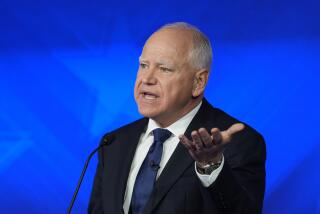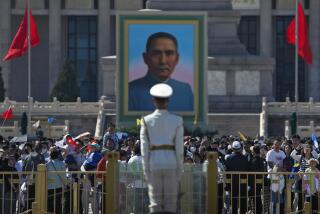Once-Jailed Official Defies Threats, Speaks Out
- Share via
BEIJING — Only a day after President Clinton’s news conference with his Chinese counterpart seemed to point to a new era of openness here, security officials Sunday came to the home of a former senior Communist Party official jailed during the 1989 Tiananmen Square crackdown and sternly warned him to keep his mouth shut.
“I was told by the police I have to refuse to give any interview to any foreign journalists,” said Bao Tong, who is the highest-ranking proponent of democracy to emerge clearly from within the ranks of the Chinese Communist Party. “They stayed in my house for two hours.” As a result, Bao felt compelled to cancel a planned meeting with a Times reporter.
Nevertheless, Bao braved the threats and, in a remarkable 75-minute telephone conversation in Beijing on Sunday night, offered his views on Clinton, Chinese political leaders, Marxism, democracy and the tumultuous events of 1989 that led to his imprisonment.
“The president [Clinton] enjoys freedom of speech,” Bao quipped, referring to Clinton’s frank exchanges with Chinese President Jiang Zemin aired on Chinese television Saturday.
But for the Chinese people, he observed, there is not the same freedom. “Maybe there is freedom of speech with Chinese characteristics,” Bao, speaking in English, said sarcastically.
Bao said he felt Jiang had employed the unusual news conference over the weekend to demonstrate his own political strength inside China by standing up to the American president. At the same time, Bao praised Clinton’s performance, saying that “he expressed his ideas clearly and properly” in what amounted to a political debate with the Chinese president.
A decade ago, Bao Tong was a figure in China comparable to, say, White House Chief of Staff Erskine Bowles or National Security Advisor Samuel R. “Sandy” Berger. He was the chief of staff to Communist Party Secretary Zhao Ziyang until the two men opposed a crackdown on the Tiananmen Square demonstrators in 1989.
Zhao was ousted from power a few days before the bloody military assault in Beijing on June 4, 1989. He remains today under a loose form of house arrest.
“I haven’t met him [Zhao] for more than nine years,” Bao said of his former boss. “I don’t know his phone number. And if I knew it, I don’t think I can call him on the phone.” Jiang is Zhao’s direct successor as head of the Communist Party.
Bao himself was thrown into prison in late May 1989, soon after then-Premier Li Peng declared martial law in Beijing, where nearly a million demonstrators had gathered to seek democracy and an end to corruption and nepotism within the Communist Party.
On May 28, 1989, Bao recalled, “They called me at my home to come to have a meeting.” Where was the meeting supposed to be? “Middle South Sea . . . you know it?” Bao asked. That is the English-language rendition of Zhongnanhai, the compound where China’s highest leaders live and work.
“And when I got into the car, I was driven to the prison.”
It was Qincheng Prison, the jail outside Beijing where political prisoners are often kept--the same place where Jiang Qing, Mao Tse-tung’s widow, was taken a few weeks after her husband’s death to languish for the rest of her life.
Bao said he spent the entire time at Qincheng in solitary confinement, “alone all the time for seven years.” Finally, he was released in May 1996.
In late May of this year, Bao was told that his probation was over and that his political rights had been restored. In a couple of interviews immediately afterward, he quickly began criticizing the current leadership of the Communist Party, of which he is no longer a member.
Chinese security officials warned him to stop.
“The first [warning] was issued on June 4, and the second was issued on June 8,” Bao said. “They told me it is improper for me to receive any illegal interviews made by any foreign journalists without authorization from the government.”
On Sunday, when security officials visited Bao’s home and told him to stop talking, it was the third warning he had received in a month. “They said the first time, maybe I didn’t know the law. The second time, maybe I didn’t understand. They said, ‘This time, you should obey the law,’ ” Bao explained. He said he still doesn’t know what the law and rules are for interviews.
Bao was upset by this latest visit. He said he reminded the security officials visiting his home that only a day earlier, at the Saturday news conference, the Chinese president “confirmed that every Chinese citizen is given freedom of speech by the [Chinese] Constitution.”
“I said that if I speak out frankly, it will do no harm to the government. It will benefit the government. I said if I refuse to answer the questions put forward by the newsmen, everyone will think I am suffering from some pressure from the government.”
*
Chinese officials told him that he had full freedom of speech, Bao said, but then they added: “You cannot answer any questions put forward by the journalists.”
He said he felt the most important task faced by China’s Communist Party leadership today is “to take steps for political reform, actively. That is the only way to save the party, I think. It is the only way to regain the support of the people.”
Asked whether he is still a Marxist, as he was when he joined the Communist Party many years ago, Bao replied: “I think Marxism was a good theory for the 19th century and the beginning of the 20th century.” He said he now believes that Marxism stands for “humanism and democracy.”
Back in the 1980s, Bao dealt with many of China’s top leaders, including not only Zhao but his predecessor, Hu Yaobang, who was ousted as Communist Party secretary in 1987 after challenging the privileges of the party’s elderly leaders.
“I myself adore both of them [Hu and Zhao] very much,” he said.
“Once, I said that there are three types of Marxists. One is Hu. He is very enthusiastic and hot as fire. The second type is Deng [Xiaoping], as cold and strong as ice, sober-minded, cool-handed. The third type is Zhao, always friendly and for humanity, full of human feelings.”
Now that he is out of jail, Bao, who is 65, lives in Beijing with his wife, daughter and 9-year-old granddaughter, whom he escorts to and from school every day.
“Just now, I play househusband. I do every kind of housework,” he said. “It is quite a rest for me. . . . It is quite a release for my brain.”
Nevertheless, Bao admitted that he worries about what might happen to him after Clinton’s visit.
The security officials who visited his home did not threaten him with a new prison term, Bao said.
“But of course, my friends advise me it is quite a serious situation for me to accept interviews, they think. They advise me to keep silent for a while and wait and see. . . .
“If something will happen [to me], it will happen after the departure of the president.”
The former Communist Party official said he thought it was important for the Chinese television audience to hear Clinton voice support for the democracy demonstrations of 1989, “especially when everybody has to keep silent in this nation.”
He predicted that “sooner or later,” the Chinese Communist Party will reverse its condemnatory judgment of the 1989 demonstrations. But Bao said he is skeptical that the party is on the verge of serious political change right now. He said he is waiting to see what happens.
When asked directly what he thought of the way the Chinese Communist Party decided to use force in 1989, he suddenly grew cautious.
“I was warned just this afternoon,” he said. “But you do know what is in my mind, I think. Maybe we can talk about it another time.”
More to Read
Sign up for Essential California
The most important California stories and recommendations in your inbox every morning.
You may occasionally receive promotional content from the Los Angeles Times.













